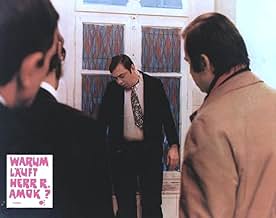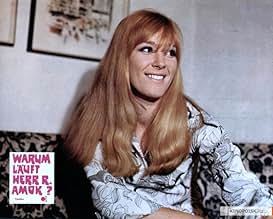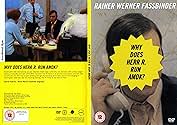Perché il signor R. è colto da follia improvvisa?
Aggiungi una trama nella tua linguaWith slicked-down hair and three-piece suits, dependable Herr Raab is a technical draftsman. He gets along with his colleagues although his boss wants him to go beyond technical cleanliness ... Leggi tuttoWith slicked-down hair and three-piece suits, dependable Herr Raab is a technical draftsman. He gets along with his colleagues although his boss wants him to go beyond technical cleanliness to problem solving. He's a dutiful husband; his wife's a social climber and pushes him to ... Leggi tuttoWith slicked-down hair and three-piece suits, dependable Herr Raab is a technical draftsman. He gets along with his colleagues although his boss wants him to go beyond technical cleanliness to problem solving. He's a dutiful husband; his wife's a social climber and pushes him to seek a promotion, but they also share sweet moments. He's a caring father, helping his son... Leggi tutto
- Regia
- Sceneggiatura
- Star
- Premi
- 3 vittorie e 2 candidature totali
- Kollege im Büro
- (as Harry Bär)
- Opa Raab
- (as Herr Sterr)
- Oma Raab
- (as Frau Sterr)
- Schallplattenverkäuferin
- (as Carla Aulaulu)
Recensioni in evidenza
Another problem, perhaps in a certain perspective even more delicate, is the border between a deed in thought and a deed in fact. Many people kill others in their wishes, dreams, they even say it without meaning it. On the other hand, some people would never say it, but then there is a moment when they do it. What is it that causes the transgression between thought and deed? R.W. Fassbinder presents a fully uncommented, non-condemnatory approach in "Warum Läuft Herr R. Amok?" (1970). Up to a certain degree, the absolute free speech which gives the illusion of everyday-conversations observed by a candid camera, has the form of a Brechtian "Lehrstück", however, there is no wagging finger to sense in this movie. The spectator is elevated into the position of the judge - if he really still thinks that the deed of Herr R. can be judged after having watched and understood the movie. The spectator even becomes a part of the movie, without him the communication scheme is incomplete. He is the receiver of a message from whom not even an answer is expected, but a revision in thinking on the basis of which has been presented to him. "A good movie is a movie that does not stop when people come out of the cinema, but continues in their heads", Fassbinder said once.
Fassbinder pulls it off marvellously in 'Why Does Herr R. Run Amok?', one of his best early films, from 1970. This particular punchline connects as hard as a blow to the back of the head.
If a life can only be understood backwards, this film parodies the theory by emulating it.
Fassbinder's nihilism knew no bounds.
Because, frankly, this isn't like the Fassbinder you would be used to after seeing, for example, the BDR trilogy or Fear Eats the Soul. It's as if Fassbinder and/or Fengler contracted Al Maysles to follow an 'average' middle-class German family, the father and architect and the wife a, uh, house-wife I guess, with an 'average' child. The style of dialog is improvisation, and the camera-work reflects this with the "cienema verite" approach. Indeed there may be only about 30 actual shots in the whole film; it's a series of long takes as the DP, Dietrich Lohmann, goes around a room and zooms in or out based on a feeling here or there or something that may be of interest (such as the desperation Herr R tries his best to hide in most scenes).
What happens with this style, for better or worse, is that we get into the daily grind, the mundane conversations in a living room or in a car (i.e. car repairs), a trip to the school for a talk with the teacher about the kid, or a trip to the not-totally sympathetic doctor, or the embarrassing toast that Herr R makes in front of his co-workers and boss. There is the mundane, and its so much that one starts to get into this mood. There is a drawback if one isn't ready/willing/able to be in this style; not a lot "happens" in the film until, of course, the frighteningly sudden climax of the "Amok" part of the title. Indeed there's something to this that draws in the audience with the characters; there's a scene where Herr R, his wife, their son and a couple of friends are walking along on a road, and it goes on for so long (both the shot and the slow walk) we, as well as the parents, don't realize that the son has gone off on his own and don't know where he ventured off.
Herr R. is an emotional story, but it's a little hard to penetrate. But for those who are patient and attentive there are some great rewards. One of these is Kurt Raab's performance (who, by the way, is also called Mr. Raab in the film, which adds to the confusion of whether this is documentary or fiction, or both at the same time); it's a performance that is tricky but works very well, full of subtlety and restraint, eyes darting carefully and physical expressions to the dot meant with importance. The performance is improvised, but there's nothing I can see that wasn't thought through to be on the screen by Fassbinder and/or Fengler. And it's this character, if nothing else, that marks it as the indicator of it being from RW; it's about the alienation of an outsider, someone in such a mundane world, so "normal" that there is barely any expression of individuality, of anything outside of a "norm" being seen as anything except quiet (or not so quiet) scorn. This is set up from the start with the characters telling the jokes, and Herr R's going flat with everyone else.
It's basically a super-low budget experiment in reality-as-drama, about the emptiness of a class system that allows people to live comfortably and with some semblance of peace, but also a form of life that can be shattered so easily and with such terror. The ending, indeed, can only be really comparable to the likes of Haneke's Cache for its random, existential impact. The more one lets Herr R in, the more this world is horrible and cruel and desperate. Not the brightest of times to have, but worthwhile all the same.
Here, in opposition to his more characteristically considered style, a shaky hand-held camera eavesdrops on the eponymous Herr R.(played to perfection by the great Kurt Raab) who is tediously seen at his work, with his wife, during a visit from his parents and the like, while slowly unwinding inside.
Long takes predominate and we are also let into the life of Herr R.'s pretty but equally vapid wife for whom he, in a most affecting scene, buys a record without knowing the singer or song title - much to the shameless merriment of the shop-girls who serve him. Fassbinder keeps the tension tightly wound throughout and it is this knowing sense of what to show and when to withhold that gives the greatest indication that this is the work of a man who was to become one of Europe's greatest film-makers since Ingmar Bergman.
No doubt, many will find the extreme sense of realism and boredom too oppressive but 'Herr R.' has proved to be highly influential on a much later generation of film-makers and still retains the power to provoke and unsettle.
Lo sapevi?
- QuizIn 2003 on a interview for Village Voice Hanna Schygulla claimed that this film was completely done by director Michael Fengler, whereas purported co-director Rainer Werner Fassbinder had nothing to do with the actual film. She also claimed that film was almost completely improvised which wasn't Fassbinder's way to make movies. Fassbinder still is credited as director and writer on the actual film and on many official sources, including Fassbinder Foundation's website. This fact has been confirmed by Michael Fengler himself in the 2008 documentation Gegenschuss - Aufbruch der Filmemacher (2008). He reported, that Fassbinder was involved neither in writing nor in directing of the movie and has visited the movie set at most twice during shooting.
- BlooperWhen Herr R. leaves the doctor the camera team can be seen in the mirror on the wall.
- ConnessioniFeatured in Sehnsucht nach Sodom (1989)
I più visti
- How long is Why Does Herr R. Run Amok??Powered by Alexa
Dettagli
- Data di uscita
- Paese di origine
- Lingua
- Celebre anche come
- Perché il signor R. è diventato matto?
- Luoghi delle riprese
- Müllerstraße 40, Monaco, Baviera, Germania(bureau, Franz Maron, Architekt/Dipl. Ing.)
- Aziende produttrici
- Vedi altri crediti dell’azienda su IMDbPro
Botteghino
- Budget
- 135.000 DEM (previsto)
- Tempo di esecuzione1 ora 28 minuti
- Mix di suoni
- Proporzioni
- 1.37 : 1





























